
Short URL: http://tinyurl.com/Steele-IG
Executive Reading (Printable 10-Pages):
2013 Steele Reflections on Inspectors-General 1.7
Updated 6 October 2012 Version 1.7
When I was selected for an interview to be the Defense Intelligence Senior Leader (DISL) for Human Intelligence (HUMINT) at the Defense Intelligence Agency (DIA), it was General Ron Burgess, USA and Ms. Tish Long that decided whether to accept panel recommendations or not. [Today DIA is under new management — one can only hope that General Mike Flynn, USA, has it in him to clean house, restructure, and start being effective at providing decision support to policy, acquisition, and operations, leveraging what he can control: use MASINT as the bill-payer, and execute full-spectrum HUMINT in M4IS2 mode, while flushing the DI. I continue to believe an Open Source Agency is needed, but NOT under intelligence auspices.]
I learn from every experience, and was inspired by Peter W. in particular, then Chief of Staff for DIA/DH, to the point that after my interview I went home, sat down, and wrote the following in one sitting (polishing it considerably over the weeks to follow). I am including the pre-publication approval letters below because I understand there are still köyün delisi out there who think that just because I have been under non-official status these past 20 years, I have somehow forgotten my obligations.
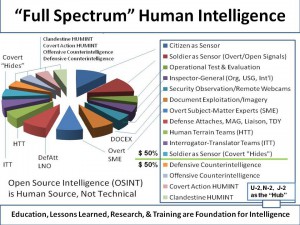
Human Intelligence: All Humans, All Minds, All the Time (Strategic Studies Institute, 3 June 2010)
HUMINT DoD OK with two changes
The single most important graphic in the above work is shown here to the side.
Today I want to focus on one of the fifteen HUMINT slices, the Inspector-General (IG). Although some progress has been made in developing Inspectors General for every agency and department, and in creating networks of Inspectors General both across the federal government and internationally, I do not believe the fundamentals of the Inspectors General have evolved properly, and therefore consider most Inspectors General to be doing the wrong things righter (reactive micro audits) instead of the right things (proactive holistic meta-training and education — integrative program formation).
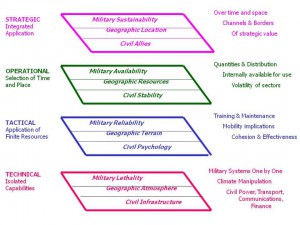
Executive Summary:
The role and responsibility of the Inspector General (IG) should be reframed, to encourage the critique of programs from an additional perspective. For IGs in national security, in national competitiveness, and in national intelligence (including education and research) that perspective should hold up as a standard that the IG communicates well to policy makers, acquisition managers, and operational commanders; at the same time that the information provided is relevant to whole-of-government action, serving whole-of-nation interests, with inter-agency and inter-agency transparency allowing for error detection and correction. Such a perspective is assumed to be the responsibility of those higher in a hierarchy, but that is a mistake. It is a perspective that can be applied at all levels, and in fact can only be effective if it is applied at all levels. IGs might be better at applying this perspective exactly because they are in the middle – able to connect operational knowledge with national interest. Just as the General Accountability Office (GAO) changed from Accounting to Accountability, so also must Inspectors General now follow suit: my vision empowers IGs and those they support by enabling a holistic and integrity forcing function to operate across all boundaries….in addition to inspecting they are sensing, engaging, empowering, educating, and above all, ensuring that the public interest is addressed in a coherent holistic honest manner at every level (strategic, operational, tactical, and technical). Beyond an order of magnitude increase in the IG's value within their individual relative domains, there is an opportunity at the grand strategic level. The ultimate task of a 21st Century IG, in my personal view, is to work as a body whole across all boundaries, to assure the public that its government will always seek righteous ends, administer cost-effective ways, and live within our means, the public means. St.
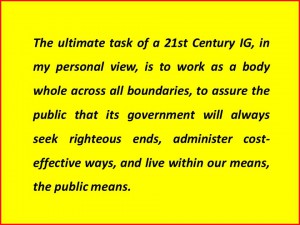
Table of Contents
- Historical Gravitas of the Inspector General
- Inspector Generals Today (Focus on the USA)
- Dr. Russell Ackoff’s Wisdom — Bright Light for Inspectors General
- Intelligence is Irelevant
- Communications is Broken Beyond Repair
- Irrelevant Noise
- The Office of Management and Budget (OMB) Does Not Manage
- Inspectors General as the Seed Crystal for Elevating Intelligence with Integrity
- What Is the Big Picture?
- Appreciating Waste in the USA Today – 50% of Every Tax Dollar
- What is Our Starting Point? Intelligence with Integrity, Championed by Inspectors General
- “Strategic Decrepitude” — Hell's Front Door
- What Is To Be Done?
Historical Gravitas of the Inspector General
There are two facets of the original Inspectors General that warrant emphasis today. First, they were authorized and expected to examine everything within their sphere of influence — they did not sit back and wait for Congressional Inquiries (CONGRINT), whistle-blowers, or media exposure. Second, under General George Washington, once established in 1777, they were the principal catalyst for training and for assuring readiness. Source
Congressional requirements emerged simultaneously. Congress required that the Inspectors General function as a source of information on the public's investment, and on ensuring that officers command properly and treat soldiers with justice — which is to say, that officers have integrity. Source
The U.S. Navy, steeped in the culture of “master after God,” was able to avoid having an Inspector General until 1942. Once established, the Navy IG became a general trouble-shooting service for the Chief of Naval Operations (CNO), with the authority to draft subject matter experts as needed for any specific inquiry. Source
The U.S. Air Force, separating from the U.S. Army in 1947, established an Inspector General in 1948, with three missions: determining the combat and logistics effectiveness of the Air Force; insuring the maintenance of discipline and security; and the investigation of matters involving crime and other violations of the public trust. Source
Across the U.S. Government (USG) over time, other departments and agencies established Inspectors General as they saw fit, but in 1978 Congress enacted the Inspector General Act of 1978, to combat fraud, aubuse, and waste in the programs and operations of the federal departments and agencies. It is at this point that the independence of the Inspectors General from their parent agency's leadership is codified in law. It is also at this point that Inspectors General become more about audit and financial propriety than about training, readiness, and integrity. Source
I would observe that Congress requires that fraud, waste, and abuse only be identified within the Executive. There is no “controlling authority” for Congressional fraud, waste, and abuse other than the Members themselves (internal impeachment), or pressure from their own constituents on a case by case basis, so rare as to be inconceivable for the near and mid-term. The Executive can help legislators achieve their goals while not adding to the burden by constantly emphasizing that reform can be job and revenue neutral district by district — this is the single most important lesson I learned while supporting the National Security Act of 1992 (Boren-McKurdy) that was defeated by Senator John Warner (R-VA) who created the Aspin-Brown Commission instead (one letter) and then Secretary of Defense Dick Cheney (two letters).
Inspector Generals Today (Focus on the USA)
The “bible” for Inspector Generals today is focused on the audit of programs as authorized, appropriated, allocated, and obligated: the “Yellow Book,” Government Auditing Standards 2011 (GAO, 2011). I read and reviewed this book, and my review title says it all: “Mind-Numbing Waste of Time and Money.” The Yellow book is a convoluted conglomeration of procedural minutia devoid of moral or intellectual context. Inspector Generals are expected to audit for the facts — an Article 32 investigation on steroids — and not question the underlying policies, practices, and procedures. In effect, Inspectors General that accept this strait-jacket are neutered from day one of any investigation. IG endeavors today appear to be reactive, reductrionist, and reformative rather than transformative — far from what George Washington envisioned.
Dr. Russell Ackoff's Wisdom — Bright Light for Inspectors General
The below quotation sums up what I have been thinking for over two decades, but only encountered in this form when I began digging into Whole Systems theory and particularly reflexivity as most recently embodied in Kent Myers, Reflexive Practice: Professional Thinking for a Turbulent World (Palgrave Macmillan, 2010). In his seminal paper, “Transforming the Systems Movement” (Online, 26 May 2004), Dr. Russell Ackoff makes two preliminary points and then summarizes our challenge:
01 Citing Leslie Gelb (1991), he eviscerates the current “leadership” and the “experts” they rely on — the people that have created the mess we are in do not have the background, skills (or, I would add, the integrity) to grasp, let alone direct, a transformative agenda.
02 Transformations demand a change in how we think — stovepipes are toxic and divorced from reality. “Without changing our patterns of thought we will not be able to solve the problems we created with our current patterns of thought.” To that I would add, until we confront the moral and intellectual corruption in how we do the public business, we will not be able to act in the public interest.
03 This is one of his finest legacy statements:
The righter we do the wrong thing, the wronger we become. When we make a mistake doing the wrong thing and correct it, we become wronger. When we make a mistake doing the right thing and correct it, we become righter. Therefore, it is better to do the right thing wrong than the wrong thing right. This is very significant because almost every problem confronting our society is a result of the fact that our public policy makers are doing the wrong things and are trying to do them righter.
Referring to corporate and academic leaders and the illusion that they are focused on optimizing shareholder value or striving to educate, he concludes that the actual objective of any set of leaders (this certainly applies to Congress and the two political parties) is to “provide job security and increase the standard of living and quality of life of those….who make the decisions.” If we are to reconnect with our integrity and restore America the Beautiful, we must come to grips with this reality: absent righteous remediation (intelligence as a form of continuing education), our leaders — of policy, of acquisition, of operations — will continue to do the wrong things righter. Hence, auditing as now defined, is an enabler of the “root” pathologies. It is not transformative.
Intelligence is Irelevant
Paul Pillar, in Intelligence and U.S. Foreign Policy: Iraq, 9/11, and Misguided Reform(Columbia, 2011) has it exactly right when he points out that even if intelligence were perfect, it is irrelevant because the policy process is not evidence-based. Morton Halperin, before him, documented the lack of integrity in the policy process in Bureaucratic Politics and Foreign Policy (Brookings, 2006), noting that “Rule 1” is “lie to the president if you can get away with it.”
Even when a senior commander or official is actively interested in whatever “intelligence” (decision support) the U.S. Intelligence Community might provide, they are generally disappointed. General Tony Zinni, USMC, then Commander in Chief of the U.S. Central Command (CINCCENT), is on record as observing that he received, as CINCCENT, 4% “at best” of what he needed to know from secret sources and methods. Graphic Extract Source Article
Communications is Broken Beyond Repair
In 1992 I coined the phrase for the Commandant of the Marine, for testimony to Congress explaining why the Marine Corps was the only service that chose to put both Communications, Computing, Command & Control (C4) and Intelligence under the same flag officer:
Communications without intelligence is noise;
intelligence without communications is irrelevant.
Today we have neither–we have irrelevant noise. The legacy systems are a convoluted mess of competing elements all built by the lowest bidder and all created in the context of stove-piped hierarchies. When I was invited by the National Research Council (NRC) in 1994 to comment on the US Army's multi-billion dollar plan for “modernizing” its communications architecture, it was immediately obvious to me — and so presented to the NRC — that the Army was completely out of touch with reality and lacked all understanding of the fact that war and operations other than war (OOTW) in the future would require that they be able to communicate horizontally, not just vertically; multinationally, not just nationally; and with the other seven tribes of intelligence — academic, civil society, commerce, government, law enforcement, media, and non-government/non-profit. Of course I was blown off, just as I was blown off, also in 1994, when I sounded the alarm in a letter to Marty Harris, head of the National Information Infrastructure (NII) to tell him the President needed to allocate $1 billion a year to cyber-education and cyber-standards at “root.”
Compounding the inadequacy of our C4 is a system of information compartmentation that is out of control. Although down from 3,103 special compartments to 2,234, this plethora of “Maginot Lines” prevents anyone from actually being intelligent about anything, even if they have integrity. To his credit, Donald Rumsfeld make this the core issue when he was responsible for reviewing all available intelligence on missiles and missile defense.
Irrelevant Noise
Taken together, what we do today in the way of intelligence is irrelevant, and what we do in the way of communications and computing is noise. Command & control are out-dated concepts. Top-down hierarchies are ignorant, and education at the edge of the network — the strategic corporal — is where war and peace will be won or lost. At a time when data is the new oil, no one in the USG is serious about holistic analytics, true cost economics, machine or man-machine translation and all-source fusion with geospatial attributes, or M4IS2.
The Office of Management and Budget (OMB) Does Not Manage
Compounding the challenge of a policy process that is not evidence-based (and also an acquisition process, and very often the operational campaign planning process) is the fact that there is no Whole of Government strategy, no Whole of Government holistic analytic process for doing the planning, programming, and budgeting system (PPBS) as a whole — PPBS is about budget share, and the lies are legion at every level. OMB takes the low road, questioning numbers but never questioning the integrity of any single stove-pipe, much less the lack of integrity or holistic coherence across the stove-pipes. There is no one in OMB that can recite from memory the ten high-level threats to humanity, the twelve core policies that must be harmonized across all bureaucratic boundaries, or the eight populations / four methods that should be our contextual focus for the future. I personally would like to see OMB create a strong management capability, and perhaps even embrace the Open Source Agency as a presidential initiative that empowers OMB with public intelligence in the public interest. We must rebalance the instruments of national power.
Inspectors General as the Seed Crystal for Elevating Intelligence with Integrity
When I look at a standard organization chart for any given Office of the Inspector General, I always see audit, and I always see investigations. I do not see a division for strategic sustainability, operational availability, tactical effectiveness, or technical return on investment. Long ago, when I was Study Director for the Marine Corps' first serious intelligence product, Planning and Programming Factors for Expeditionary Operations in the Third World (MCCDC, March 1990), I not only integrated warfighter definitions of 3-5 degrees of difficulty into each of the 144 mission area factors across military, civil, and geographic, but I also demonstrated that the threat changes depending on the level of analysis.
My thinking has evolved. I am fortunate that I left for a 20-year non-official “walk-about” because instead of the same year's experience repeated over and over–characteristic of most civil servants competing for promotion–today I have–since resigning in 1993 as a GS-14 eligible for reinstatement–20 years of unique broad and deep experience in M4IS2 that no one in the US IC can match. We do not have thoughtful leaders today, something Lee Iacocca has written about — Madeline Albright described her constant condition as Secretary of State to David Halberstam as akin to being a “gerbil on a wheel.” This is not to say that everyone now serving is not a good person–they are, without question. They are trapped in a bad system that has squeezed all creativity, common sense, and personal initiative out of each individual. One is forced to “drink the kool-aid” and go along to get along. We desperately need to break out of this moral and intellectual quagmire, and it may be that one single Inspector General can illuminate the alternative path to the future. At a time when the President desperately needs a trillion dollar a year reduction in the federal budget, while optimizing how the balance is spent, it is quite clear that any Department able to surrender $300-400 billion, while leveraging intelligent design (pun intended) to enhance its capabilities in relation to actual needs, will be the arbiter of federal power going into 2013 and 2014. Any Department that could simultaneously fund the Open Source Agency and serve as the hub for Whole of Government sensibilities, would in my view be priceless to the public interest.
Based on all that I have read– over 1,800 non-fiction books since 2000, most sorted into three lists (the good, the bad, and the ugly), I am certain that beginning in 2012 intelligence with integrity is back in style. What I am not certain about is where that meme will take root first. The DoD Inspector General, for many reasons, is one of the more promissing possibilities. The National Defense University is another. I actually lean toward both — the IG as the “internal” element able to examine every nook and cranny, and the NDU as the home for the Open Source Agency (OSA), the foundation for keeping the public informed and public officials both better informed than is possible from existing sources and methods, and honest in relation to reality and what can be known from open source and methods.
What Is the Big Picture?
At the highest level, we are a “dumb nation” incapable of doing Whole of Government strategy, policy, acquisition, or operations. The Cabinet Departments represent the special interests that compete for budget share, not the taxpayers that provide the revenue being obligationed (or borrowed in the taxpayers' name). At the Departmental and Agency level, we have forgotten how to think.
The following quotation from Senator Sam Nunn (D-GA), then Chairman of the Senate Armed Services Committee (SASC), is fundamental to these reflections; it is a “master class,” in my view, for anyone aspiring to be an effective DoD Inspector General going into the future:
I am constantly being asked for a bottom-line defense number. I don't know of any logical way to arrive at such a figure without analyzing the threat,; without determining what changes in our strategy should be made in light of the changes in the threat; and then determining what force structure and weapons programs we need to carry out this revised strategy. Source (p. 3)
I realized how far we have fallen from this ideal one day while listening to General Robert Scales, USA (Ret), talk about the disconnect between the infantry and the Pentagon budget. In his words:
4% of the force takes 80% of the casualties, and receives 1% of the Pentagon budget. Source
I've been sensitive to the extraordinary lack of integrity in defense planning, programming, and budgeting for many years, but this one phrase brought it all together for me. Based on what I know about fraud, waste, and abuse as documented in other domains (agriculture, energy, health), and what I know from following the work of whistle-blower pioneers such as Chuck Spinney and Winslow Wheeler, among others, I realized that if the people that actually do most of the fighting and take most of the casualties are costing just 1% of the total budget, then we have a strong basis for scrutinizing the balance of the Pentagon budget.
Appreciating Waste in the USA Today – 50% of Every Tax Dollar
It is now documented that 47% of all food produced in the USA ends up in the trash; that roughly 50% of all energy created at centralized sources is lost in the downstream run; and that 50% of every health dollar is waste. I believe the same to be true of all other functional or mission areas, expect that in defense, homeland security, and intelligence, because secrecy further reduces accountability, I believe the total waste to be closer to 65%. It merits emphasis that Congressional pork, not Executive mismanagement, it the primary source of fraud, waste, and abuse. It is for this reason that I consider the current financial crisis to be most welcome. 2012 in my view is a year of awakening, a year of positive convergence, a year in which the good people trapped in a bad system called the US Government (USG) connect with iconoclasts such as myself who have never lost faith in America the Beautiful, but see the pathologies of misinformation and disinformation and opportunities lost far more clearly than anyone now serving, blinded as they are by arrogant ignorance. Daniel Ellsberg put this well in speaking to Henry Kissinger:
The danger is, you’ll become like a moron. You’ll become incapable of learning from most people in the world, no matter how much experience they have in their particular areas that may be much greater than yours” [because of your blind faith in the value of your narrow and often incorrect secret information]. Source
My other favorite and relevant quote is from Bob Seelert, Chairman of Saatchi & Saatchi Worldwide (New York):
When things are not going well, until you get the truth out on the table,
no matter how ugly, you are not in a position to deal with it.
To create a government that works at a cost that We the People can afford, demands that our Executive become the gold standard for transparency, truth, and trust. From such a foundation the public can be educated, Congress can be challenged, and the media can be held accountable. Transformation is rooted in the truth. That should be the job of Inspectors General, not only in isolated audits, but as a holistic approach to the entire enterprise–we must restore the Constitution — and the defense of the Constitution against all enemies domestic and foreign — as the primary value, instead of loyalty to a chain of command that all too often lacks integrity at every level.
What is Our Starting Point? Intelligence with Integrity, Championed by Inspectors General
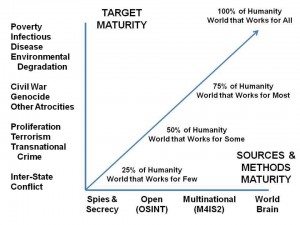
As some are aware, I have been thinking about integrity, or the lack thereof, for some time. However, it was not until I read more deeply the works of Buckminster Fuller and Russell Ackoff that I realized that in the larger context of all that we do, integrity is not just about honor, it is about the transparency and truthfulness of our facts, and the trust that truthfulness creates — a form of efficiency so powerful that a Nobel Prize has been awarded to the person that demonstrated that trust lowers the cost of doing business. My earlier thinking on this vital topic can be examined at Journal: Reflections on Integrity UPDATED + Integrity RECAP.
If our national and military strategies are not evidence-based, they lack integrity.
If our service force structure and acquisition plans are not evidence-based, they lack integrity.
If our theater commitments and behavior (drones comes to mind) are not evidence-based, they lack integrity.
If our troops are sent into harm's way on the basis of 935 now-documented lies (Iraq), then every person from the President down to the company commander executing what are in essence illegal orders, lacks integrity.
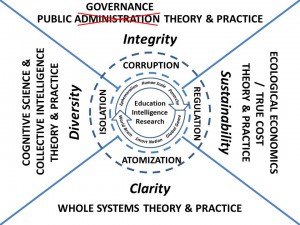
It is not my intent to go too far toward the “Open Source Everything” meme, but my most recent chapter, “The Craft of Intelligence,” and my most recent book, THE OPEN SOURCE EVERYTHING MANIFESTO: Transparency, Truth & Trust (North Atlantic Books, 5 June 2012) both do offer a conceptual approach to public governance and defense governance that is in my view an essential starting point, along with my new work in progress, PUBLIC GOVERNANCE IN THE 21st CENTURY: New Rules, Hybrid Forces, and One Constant – The Public. From the latter I include here to the side the core graphic.
We should have, today, a 450-ship Navy, a long-haul Air Force, and an air-transportable Army. The Marine Corps should be focused on contingency and expeditionary operations, not on land warfare on the Asian and African land masses. All this I have documented since 1988 across many articles and briefings.
“Strategic Decrepitude” — Hell's Front Door
“Strategic Decrepitude” is a term of art in the US war colleges. It is a Cluaswitzian term best explained by Dr. LtCol Antulio J. Echevarria II, whose book on Clausewitz and Contemporary War (Oxford University Press, 2007) I found most helpful. His brilliant dissection of “The American Way of Battle” is a classic in the field, a clear analysis of how the US Government has lost the ability to do strategy. “Strategic decrepitude” is when you confuse ideology, body counts, and powerpoint briefings with being a strategy. It occurs at the multi-national or global level, the legislative-executive level, and the agency-department level,
Today we have two-star generals personally approving individual patrols at the squad level in Afghanistan; we have almost as many Admirals as we have badly built naval vessels; we have an Army too heavy to fly and an Air Force so corrupt it refuses to admit that they have invested billions in an aircraft so toxic it literally kills the dumber pilots (the smarter ones refuse to fly this very expensive coffin). Every element of our massive and very expensive national security structure has become excessively bureaucratic and hence unfit for duty in as much as we lack agility, imagination, and integrity. The same it true of the rest of the federal government, which also kills people by concealing poisonous agricultural and industrial processes, covering up the incoming radiation from Japan, and generally “passing the buck” to the next generation.
This creates a possibility for Inspectors General, and most particularly for the Inspector General of the Department of Defense, where there is the most to gain, and quickly so, in helping the incumbent and future Presidents of the USA resurrect the near comatose body we call the federal government. OMB, GAO, CRS, the US IC — all have their contribution to make, but right now, in this time and place, I believe the IG is the best foundation for testing bold new ideas that offer very high unconventional returns, very much in the public interest.
All that I have proposed prior to this section is well within the existing charters of IGs, but now I offer the possibility of going up not by one level (inter-agency, inter-service, inter-mission area) but rather up by two levels — to the level of grand strategy and what Senator Sam Nunn (D-GA) taught me so well, the grand strategy of defining just means, cost-effective ways, and righteous ends. Actually, I have that backwards deliberately: the ultimate task of a 21st Century IG, in my personal view, is to work as a body whole across all boundaries, to assure the public that its government will alwasy seek righteous ends, administer cost-effective ways, and live within our means, the public means.
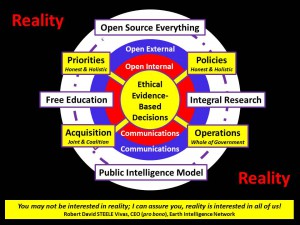
What Is To Be Done?
I see enormous potential in the restructuring of the Inspectors General (IG) to establish Deputy IG's, one each for Policy, Acquisition, and Operations, with Assistant IG's, also one each, for strategy, joint planning and programming, multinational planning and programming, and intelligence.
I see enormous potential in having the independent IG capability that Congress in its earlier epoch of coherence mandated, one able to call into question the lack of integrity (in the whole systems true cost economics sense) with which we do strategy, policy, acquisition, and operations within the specific domain of each IG.
Perhaps, if the current crisis is any incentive, there might also be some tolerance for IG experimentation–for the IG to model the thinking of adversaries, allies of convenience, and critics both domestic and foreign. It should not be the IG's role to assert that any one view is correct, only to assure that all views are on the table and that the process is one of clarity, diversity, and integrity such that we can sustain ourselves a thousand years or more into the future.
Such an IG would make George Washington proud. Such an IG could be the missing link in our evolution. St.
See Also:
2012 PREPRINT: The Craft of Intelligence [Full Text Online]
2011 Thinking About Revolution in the USA and Elsewhere (Full Text Online for Google Translate)
2010 Human Intelligence: All Humans, All Minds, All the Time (Strategic Studies Institute)
2009 Intelligence for the President–AND Everyone Else (Counterpunch)
2009 Perhaps We Should Have Shouted: A Twenty-Year Retrospective
Journal: Reflections on Integrity UPDATED + Integrity RECAP
Search: different views of the frog
Search: integrity [as of 5 Oct 2012]



